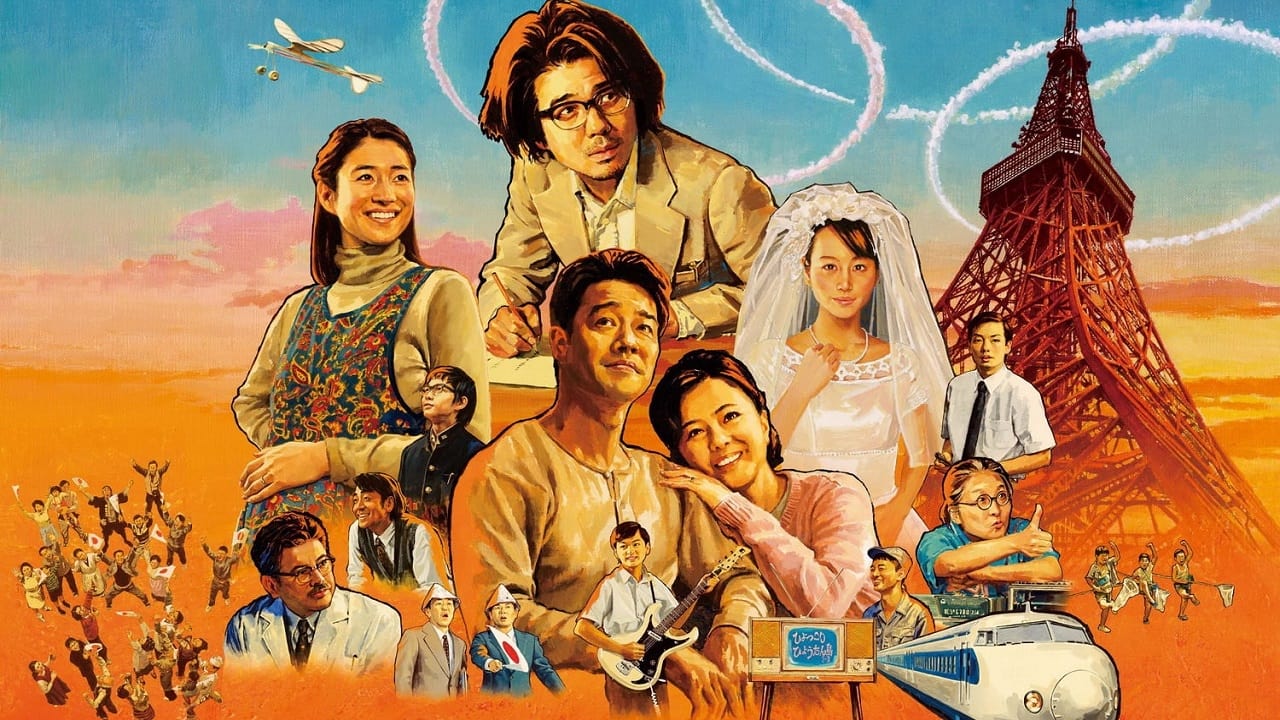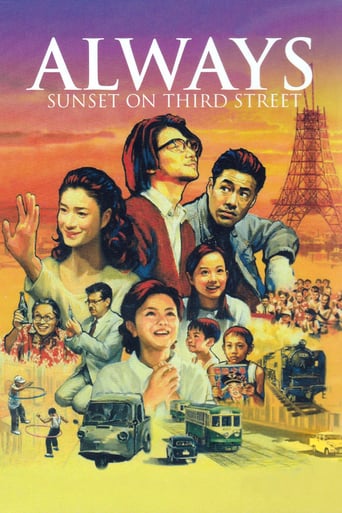

I think this is a new genre that they're all sort of working their way through it and haven't got all the kinks worked out yet but it's a genre that works for me.
... View Moren my opinion it was a great movie with some interesting elements, even though having some plot holes and the ending probably was just too messy and crammed together, but still fun to watch and not your casual movie that is similar to all other ones.
... View MoreOne of the best movies of the year! Incredible from the beginning to the end.
... View MoreThis is a dark and sometimes deeply uncomfortable drama
... View MoreI have watched Always - Sunset on Third Boulevard three times and it remains a wonderful movie experience. It gets better with each viewing like a well cooked broth. It is funny and touching at the right time. The pacing of the movie and some scenes felt like they came out of the manga, although it has so much more to offer. The cinematography and music help set a nostalgic feel of what it might have been like in 1950s Tokyo. It is full of spirit and energy where the country is on an accelerated path in rebuilding and redefining itself. There is hint of the Meiji Restoration, where the denizens of Tokyo enthusiastically absorb Western cultures, from pro-wrestling to Coca-Cola. And the building of Tokyo Tower, itself a smaller replica of The Eiffel, symbolizes the emergence of post-WW II Japan - a dichotomy of Eastern identity that embraces Western advancements.The product design and CGIs were top notch for its time, and I love how they use the different stages of Tokyo Tower's construction and the seasonal changes to mark the individual story arcs' progression.The movie embraces its manga roots with sincerity: all the characters' quirks and social slapsticks remain intact. Horikita Maki's Mutsuko is simply adorable as the country girl (check out that rural dialect) trying to make it in a big city. The uncommon romance between the gorgeous host girl Hiromi and the oddball writer Ryunosuke. Plus many more delightful details make Always, not only a funny snapshot of behavioral comedy, but also a touching ode to a bygone era.How can you not love a movie filled with this much heart?
... View MoreBeautiful, simple and fantastic movie about everyday difficulties and joys. Saw it twice and wept as much the second time. Although over two hours long there was never a second of boredom. Extra cred for making Tokyo in 1958 so realistic, still without skyscrapers and metros! Characters was very well chosen. Even the kids are real professionals here!The main plot is about two stories waved together skillfully. A young "has-been" novelist meets a young boy who was abandoned and is been forced to take him in for the time being. A girl from the countryside takes a job in the big city, Tokyo, at what she thinks is a big automobile company (Suzuki auto). But nothing is what it seems! It's about love beyond family ties, but never the less easy.
... View MoreIt begins with a view from a young girl getting her grand dream of working in Tokyo and expands into such a complex story. A wonderfully written movie with a great story telling of humanity and lessons of life that everyone can learn from. It's a beautiful movie. Why isn't it here in the US??? I saw the movie en-route to Tokyo in March 2006. there were a lot of foreign films that are very well down, perhaps, American film makers should watch more foreign films and learn how to tell a story right. This movie alone worth my trip and I will always travel on China Airlines for it's good choice of movies. Movies like this should be imported more often. All actors done a good job. I have only cried about a movie twice before, this is the 3rd film made me cry!
... View MoreI went from cautiously liking this film in the first 40 minutes to despising it in the last hour or so. The schmaltzy sentimentality accumulates and creeps up on you, until towards the end you feel overdosed on insincerity to the point of nausea. The emotion portrayed is utterly hollow and manipulative in its dishonesty. By apparently trying to copy/compete with Hollywood at its most disingenuous, this film surpasses the worst of Hollywood hypocrisy. There is plenty of style in the technical aspects of the film-making, but for all the "realistic" computer graphics recreating the city of Tokyo in 1958, no amount of vacuous slickness can give any honesty, reality or authenticity to the people and situations. The empty "rebirth symbolism" of the construction of the tower is an appropriate reflection of the empty film itself; is the film's soullessness symptomatic of the soullessness of the country's "rebirth" since the destruction of 60 years ago?
... View More